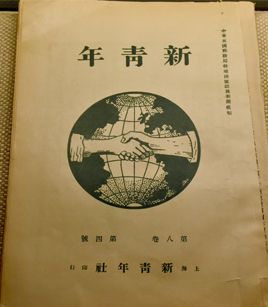New Culture Movement and May Fourth Movement

An issue of the monthly magazine New Youth displayed in the Red Building in Beijing Photo: CFP
The New Culture Movement was a 1915-23 campaign in China that criticized traditional Confucian norms and promoted a new Chinese culture based upon the introduction of Western thoughts.
In 1915, the revolutionary scholar Chen Duxiu (1879–1942) established the influential reform journal New Youth. New Youth published articles criticizing conservative Confucian ideas, proposing that China’s youth undertake a vast intellectual, literary, and a cultural reformation to rejuvenate the nation, and exalting Western concepts such as democracy and science. These approaches set in motion the New Culture Movement.
The New Culture Movement, led by Chinese intellectuals, promoted vernacular literature (literature written in the vernacular language, or baihua, rather than the classical style), individual freedom, women’s liberation, a re-examination of traditional Confucian systems, democratic values, and other Western philosophies. It greatly shook the feudal belief system which ruled China for over 2,000 years, making scientific thinking and Marxism popular in China, and became the progenitor of the May Fourth Movement.
It is widely accepted that modern China began with the May Fourth Movement, which was a great patriotic and sociopolitical reform movement growing from student protests of the Beiyang government’s weak response to the Treaty of Versailles. The protest was first launched in Beijing on May 4th, 1919. During the May Fourth Movement, intellectuals with communist ideas developed and disseminated Marxism throughout the country. Gradually, the working class and farmers came forward to participate in the campaign.
The May Fourth Movement fostered China’s development towards a modern society. In 1949, the government of the newly-founded People’s Republic of China declared May 4th to be China’s Youth Day to preserve the spirit of the May Fourth Movement.
Edited by REN GUANHONG
